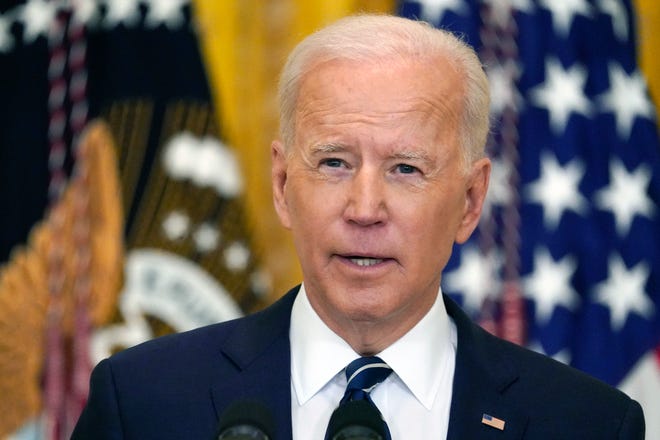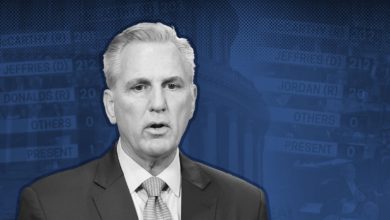
WASHINGTON — President Joe Biden will unveil a $2 trillion plan Wednesday to rebuild the nation's aging infrastructure, support electric vehicles and clean energy, and boost access to caregivers and their pay in a massive undertaking that would be the centerpiece of his economic agenda.
The White House is billing the proposal, dubbed the American Jobs Plan, as a domestic investment not seen in the U.S. since the construction of the interstate highways in the 1950s and the Space Race a decade later.
Biden wants to raise taxes on corporations to pay for the eight-year spending package, according to an administration official. He will propose increasing the corporate tax rate to 28% – resetting to the level before passage of President Donald Trump's tax cuts in 2017 – and overhauling how the U.S. taxes multinational corporations by increasing the minimum tax on U.S. corporations to 21%.
Republicans tee up attacks:Even before Biden unveils his infrastructure plan, GOP is panning it as going too far
Biden will formally unveil the plan Wednesday afternoon in a speech at a carpenters training center in Pittsburgh, where he will make the case for the "urgency of the moment" to "revitalize our national imagination and put millions of Americans to work right now," the official said.
It will be just the first piece of Biden's larger "Build Back Better" agenda, with a separate proposal addressing health care, education and child care expected in April.

Biden faces a giant challenge politically to find Republican support in Congress for his legislative package, even as infrastructure generally has widespread bipartisan support. Republicans have balked at the suggestion of tax hikes and warned they would oppose a package that strays from core transportation infrastructure and tackles climate change and social justice.
$621 billion for roads, bridges, rail and electric vehicles
The American Jobs Plan would pump $621 billion into transportation infrastructure and resilience, including the repair and construction of roads, bridges, transit and rail service.
That includes modernizing 20,000 miles of roads, fixing the most "economically significant" bridges in the U.S. and repairing 10,000 smaller bridges in poor condition.
A gas tax? A mileage tax?Biden wary of user fees to pay for roads, bridges and highways
Federal funds for transit projects would double under the plan. Biden also wants to direct $174 billion to electric vehicles: the construction of a national network of 500,000 electric vehicle stations, replacing diesel vehicles, electrifying bus fleets and offering tax incentives and rebates to make electric cars more affordable.
Retrofitted homes, lead pipe replacement, universal broadband
Another $213 billion in the plan would go toward retrofitting and building more than 2 million affordable homes, while $111 billion would replace all the nation's lead pipes and service lines and upgrade drinking water wastewater and stormwater systems.
The plan would allocate $100 billion to upgrade and construct new public schools; $100 billion to build universal high-speed broadband infrastructure to reach all Americans; and $100 billion to upgrade the nation's electric grid and investment in clean electricity.
The plan also sets aside $18 billion to modernize Veterans Affairs hospitals and facilities and $25 billion to upgrade child care facilities.
The 'caregiving economy' and climate research

In one of the plan's most expensive programs, Biden has proposed $400 billion to expand access to affordable care for the elderly and disabled. This would involve aid to Americans to obtain services they need but lack, and expand the care workforce, including a pay boost for care workers. Most currently earn around $12 an hour.
Biden has proposed expanding access to long-term care services under Medicaid and increasing pay through the same federal program.
More:Biden faces tough balancing act on infrastructure as pressure builds on immigration, gun control
With a goal of making the U.S. more competitive against China and other nations, the plan would also pump $180 billion into the nation's research and development in technology and climate science. To strengthen the nation's supply chains, the proposal also would offer incentives for domestic production for critical goods as semiconductors, batteries and clean-energy technologies.
Fully paid for in 15 years, White House says
The tax overhaul, which the White House has labeled the Made in America Tax Plan, seeks to incentivize job creation and investment in the U.S., end profit-shifting to tax havens and ensure large corporations pay "their fair share," according to the official.
The plan would eliminate a rule that allows U.S. companies to pay no taxes on the first 10% of return when they local investments in other countries.
Under the tax hikes and other reforms – eliminating tax loopholes for intellectual property and denying companies deductions for offshoring jobs, for example – the White House projects the spending would be fully paid in 15 years and reduce deficits in the years after.
The plan would target 40% of investments involving climate and clean energy to communities considered disadvantaged, according to the official.
A sweeping infrastructure plan has been talked about by both parties for years but never executed. Trump promised an infrastructure package but did not deliver one.
To build their case for trillions in spending, the White House said the U.S. ranks 13th globally in infrastructure quality, down from fifth in 2002, and significantly lags rival superpower China in infrastructure spending. More than one-third of America's bridges need repairs, and one in every five highways are in poor condition.
The Americans Jobs Plan is Biden's second major policy proposal of his young presidency after he won approval for his $1.9 trillion COVID-19 relief bill earlier this month. Not a single Republican voted for that bill, known as the American Rescue Plan.
Democrats could choose to seek passage of the infrastructure legislation in the Senate through budget reconciliation – just like they did Biden's COVID-19 relief bill – which would require just a simple majority in the evenly split chamber and therefore no Republican votes.
The White House has not said how they will pursue moving the package through Congress.
Reach Joey Garrison on Twitter @joeygarrison.








